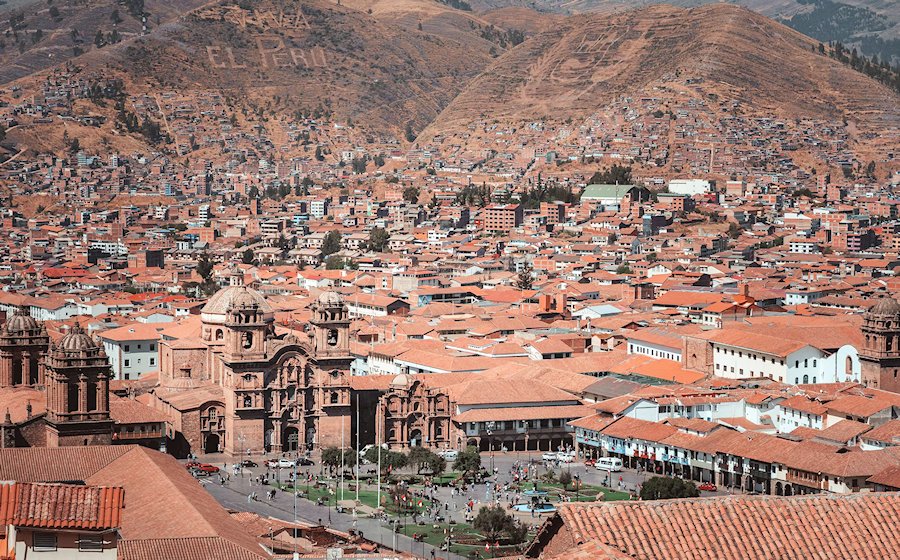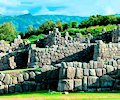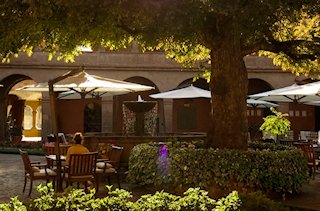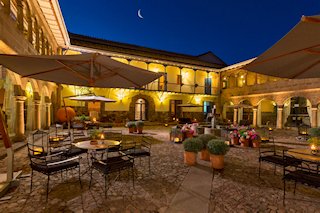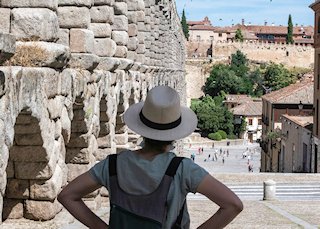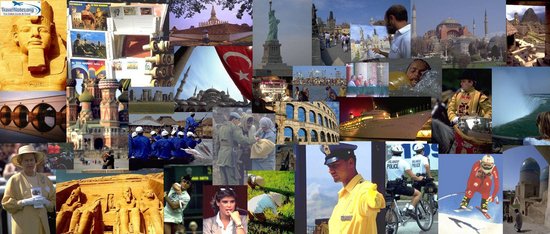Travel Notes: Destinations: South America: Peru - Cusco Travel Guide > Cusco Tours & Trips.
Short URL: https://tnot.es/CUZ
Travel Guide For Visitors to Cusco
The gateway to Machu Picchu, Cusco is rich in history and culture. Visitors can choose from various tours, including hiking the Inca Trail or taking a luxury train. Share on Facebook
Colonial City With Inca Roots
Cusco offers visitors plenty of historical sites, museums, and lively markets to explore.
 Add a Business -
Add a Location -
Add a Lodging - Add Travel Content
- Add URL
- Travel Services.
Add a Business -
Add a Location -
Add a Lodging - Add Travel Content
- Add URL
- Travel Services.
Planning the Perfect Trip to Peru's Cultural Capital
Cusco is the archaeological capital of the Americas and for many, the gateway to Machu Picchu.
When you arrive in Cusco, you'll notice ancient Inca walls seamlessly blending with Spanish colonial architecture, whilst the aroma of coca tea wafts through narrow cobblestone streets.
This former heart of the mighty Inca Empire sits majestically at 3,400 metres above sea level, offering travellers an intoxicating blend of pre-Columbian history and modern Peruvian culture.
Whether you're planning your first South American adventure or returning to explore Peru's highlands, Cusco demands more than a fleeting visit.
The city's magnetic pull extends far beyond its role as a Machu Picchu basecamp; though that alone makes it worth the journey.
Essential Cusco Travel Information
Getting to Cusco
By Air
Alejandro Velasco Astete International Airport (CUZ) receives daily flights from Lima, Arequipa, and La Paz.
Latam Airlines operates the most frequent services, with journey times around an hour and a half from Lima.
Book well in advance during peak season (May-September) as flights fill up quickly.
By Bus
Long-distance buses connect Cusco with major Peruvian cities.
The journey from Lima takes 20-24 hours, whilst Arequipa requires 10-12 hours.
Peru Hop bus offers tourist-friendly services with English-speaking guides and comfortable seating.
Weather and Best Time to Visit Cusco
Cusco experiences two distinct seasons.
Dry Season (May-September)
Expect clear skies, minimal rainfall, and cool evenings; perfect weather for outdoor activities and trekking.
However, this popularity comes with crowds and higher prices.
Wet Season (October-April)
Lower tourist numbers and reduced accommodation costs, but afternoon showers are common.
The landscape becomes lush and green, offering excellent photography opportunities.
Top Tip
Shoulder seasons (April-May and September-October) provide the best balance of weather, crowds, and prices.
Conquering Cusco's Altitude
Cusco sits around 3,400 metres (11,200 feet) above sea level, making altitude sickness a genuine concern for some visitors.
Here's how to tackle it:
Pre-Arrival Preparation
Arrive physically fit but avoid intense exercise 48 hours before travel.
Stay hydrated during your flight.
Upon Arrival
Walk more slowly, climb steps one by one and avoid overexerting yourself.
Drink copious amounts of bottled water or herbal tea to prevent dehydration, which can worsen altitude symptoms.
Gradual Acclimatisation
Start off at a lower altitude and slowly make your way up.
Consider spending time in Arequipa or the Sacred Valley before ascending to Cusco proper.
Local Remedies
Drink coca tea.
This traditional remedy has been used since Inca times.
Many hotels even provide complimentary coca tea in their lobbies.
Must-See Cusco Attractions
Historic City Centre
The UNESCO World Heritage-listed old town showcases exquisite churches, fantastic museums, and narrow cobbled streets that deserve several days of exploration.
Plaza de Armas
Cusco's beating heart, surrounded by colonial arcades and dominated by the impressive Cathedral.
Visit early morning or late afternoon for the best light and fewer crowds.
Qorikancha (Sun Temple)
The most important Inca temple, later converted into the Santo Domingo Convent.
The precision of the stonework will leave you speechless.
Archaeological Sites
Stunning Inca ruins within the city and in the surrounding hills create a feeling of travel magic.
Puka Pukara
The 'Red Fortress' offers panoramic views across the Cusco valley and serves as an excellent sunset viewing spot.
Sacsayhuamán
This massive fortress overlooks Cusco and demonstrates incredible Inca engineering.
The perfectly fitted stone blocks, some weighing over 200 tonnes, remain an archaeological mystery.
Tambomachay
Known as the 'Bath of the Inca', this site features intricate water channels and fountains carved from stone.
Day Trips from Cusco
Machu Picchu
The obvious highlight of a visit to Cusco requires advance booking.
Choose between the classic train journey or multi-day trekking options like the Inca Trail or Salkantay Trek.
Rainbow Mountain (Vinicunca)
The mineral-rich mountain displays stunning natural colours, though the 5,200-metre altitude makes this challenging trek suitable only for well-acclimatised visitors.
Sacred Valley
This fertile valley contains numerous Inca ruins, traditional markets, and picturesque villages.
Plan a full day to explore Pisac, Ollantaytambo, and Chinchero.
Cusco Accommodation Options
Budget Options
Backpacker hostels cluster around the San Blas neighbourhood, offering dormitory beds and basic private rooms.
Many provide communal kitchens and social areas.
Luxury Accommodations
High-end hotels in Cusco provide spa services, gourmet restaurants, and personalised altitude adjustment programmes.
Belmond Hotel Monasterio
Belmond Hotel Monasterio (Nazarenas 337)
The Belmond Hotel Monasterio is a highly rated luxury hotel near the main square, known for its historic charm and upscale amenities.
Palacio del Inka
Palacio del Inka (Santo Domingo 259)
This is often regarded as the best luxury hotel in Cusco. It features recently renovated rooms with modern comforts, a Turkish steam bath, sauna, jacuzzi, and exceptional service. The hotel itself feels like a museum, offering an immersive cultural experience right in the city centre.
Mid-Range and Boutique Hotels
Boutique hotels in converted colonial buildings offer character and comfort.
Casa Andina Hotels
Casa Andina have several properties in Cusco, ranging from standard to premium.
Casa Andina Standard Catedral (Sta. Catalina Angosta 149) is praised for its cleanliness and convenient location near the main square.
Casa Cartagena Boutique Hotel & Spa
Casa Cartagena Boutique Hotel & Spa (C. Pumacurco 336) is a boutique hotel with a great reputation for comfort and style, and is also near the main square.
Tika Wasi Casa Boutique
Tika Wasi Casa Boutique (Calle Tandapata) is a unique hotel with a hostel vibe, known for its phenomenal breakfast and distinctive rooms.
You may want to look for properties with central heating and oxygen services; if you need them.
Tourist Map of Cusco
Use the Tourist Map of Cusco to help you decide where to stay in Cusco based on travel budget, preferred location, planned must-see attractions and local must-do activities.
Cusco Food and Drink Scene
Local peñas (folk music venues) offer authentic cultural experiences in Cusco.
Recommended Restaurants
Republica del Pisco (C. Plateros 354) offers excellent Peruvian cuisine with an extensive pisco selection.
Green Point Vegan (Carmen Bajo 235) caters to plant-based diets with creative interpretations of local dishes.
Traditional Cuisine
Cusco's culinary scene blends indigenous ingredients with Spanish influences.
Alpaca Steaks - Lean, flavourful meat similar to beef.
Chicha de Jora - Fermented corn beer, the traditional Inca beverage.
Cuy (Guinea Pig) - A traditional delicacy, usually roasted whole.
Quinoa Soup - Hearty and nutritious, perfect for high-altitude dining.
Getting Around Cusco
City of Cusco
Walking remains the best way to explore Cusco's compact historic centre.
However, everything looks very close on the maps but it's not, so plan accordingly.
Local Buses
Cheap but crowded public transport connects outer areas to the city centre.
Taxis
Abundant and affordable, but always agree on the fare before departure.
Uber operates in limited areas.
To Surrounding Attractions
Many different tourist attractions in Cusco are miles away from each other so it's likely you'll be taking lots of tours.
Group tours provide the most economical option, whilst private tours offer flexibility and personalised experiences.
Practical Cusco Travel Tips
Cultural Sensitivity
Dress modestly when visiting religious sites.
Learn basic Spanish phrases; locals appreciate the effort.
Photography of locals often requires permission (and sometimes payment).
Respect indigenous traditions and customs.
Health and Hygiene
Carry hand sanitiser and basic medications.
Consider travel insurance covering high-altitude activities.
Drink bottled water to avoid stomach upset.
Eat at busy restaurants with high turnover.
Money Matters
ATMs are plentiful, but notify your bank about travel plans.
Carry small denominations for tips and local purchases.
The Peruvian Sol (PEN) is the local currency.
US Dollars are widely accepted in tourist areas.
Safety Considerations
Avoid displaying expensive electronics or jewellery.
Petty theft targets tourists, especially around markets and train stations.
Stay aware of your surroundings in crowded areas.
Use hotel safes for valuables.
Planning Your Cusco Itinerary
Bare Minimum Visit - Three to Fours Days
Day 1 - Arrival and gentle city exploration.
Day 2 - Major archaeological sites (Sacsayhuamán, Qorikancha).
Day 3 - Sacred Valley day trip.
Day 4 - Machu Picchu excursion.
Ideal Duration - Five to SevenDays
Additional time allows for a Rainbow Mountain trek, local cooking classes, market visits and souvenir shopping, and rest days for altitude adjustment.
Stay For Longer - One to Two Weeks
Those with more time to spare can engage in multi-day trekking adventures, enjoy immersive cultural experiences, explore lesser-known archaeological sites, and maybe even learn Spanish or Quechua.
Respect, Patience and Curiosity
Cusco rewards those who approach it with respect, patience, and curiosity.
The city's 3,400-metre elevation might challenge your lungs, but the cultural richness will fill your soul.
Plan ahead, acclimatise properly, and prepare for an unforgettable South American adventure.
Remember, Cusco isn't merely a stopover en route to Machu Picchu; it's a destination that deserves your full attention and several days of exploration.
The ancient stones have witnessed centuries of history, and with proper preparation, they'll witness your own transformative journey through Peru's most captivating city as well.
More City Travel Guides
Cities in Africa - Cities in America - Cities in Asia - Cities in Australasia - Cities in Latin America - European Destinations - Middle East.
More From Travel Notes
Travel Notes Online Guide to Travel
Africa - Asia - Caribbean - Europe - Middle East - North America - Oceania - South America.
The Travel Notes Online Guide to Travel helps visitors plan their trip with country and city travel guides, local tourist information, reviewed web sites, and inspiring travel content.
Travel and Tourism Guides on Travel Notes
 If you find Travel Notes useful, please take a moment to
like us on Facebook and share with your friends on social media.
If you find Travel Notes useful, please take a moment to
like us on Facebook and share with your friends on social media.
Share on Facebook
Travel Resources
.
Travel & Tourism With Industry Professionals.

